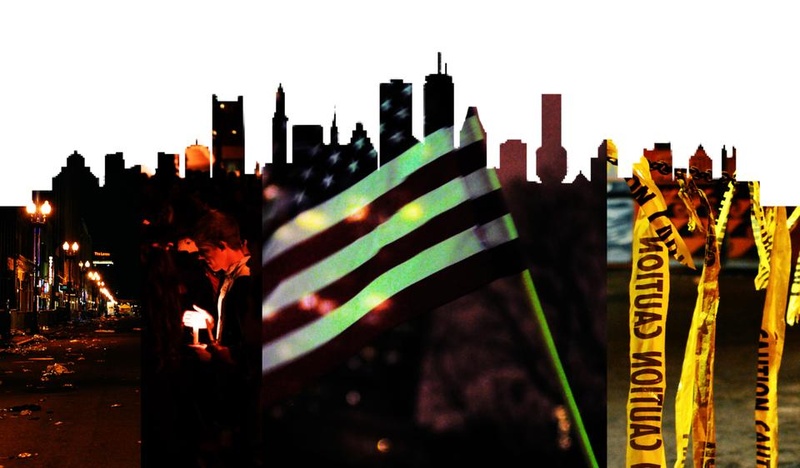For months he had dreamed of crossing the finish line. At mile 24 of the Boston Marathon, the fatigue had hit, and Dennis J. Purcell '13 did not think twice when he heard someone say “explosion.” He continued to run. Ten minutes later, when his mother and sister pulled him to the sidelines and alerted him of what was unfolding around mile 26, he realized he would not make it to the end of the course.
Two fatal bombings had interrupted Boston's annual celebration of athleticism and patriotic spirit. What started Monday would span the week, culminating in a manhunt for the suspects that would paralyze greater Boston and place members of the Harvard community within miles of a suspected terrorist. In the face of an ever-evolving crisis, the moving parts of Harvard's complex network of security, communication, and campus services mobilized to react to the unfolding events.
Monday, April 15, approx. 2:50 p.m.
When reports of a potential terrorist attack in Boston reached Harvard, University President Drew G. Faust and Executive Vice President Katherine N. Lapp were both in Holyoke.
Lapp was waiting to start a meeting with a University Health Services administrator when she answered a call that alerted her of the tragedy. Faust, walking out of a doctor's appointment herself, bumped into someone who had heard reports of the bombing on the radio.
Both immediately rushed to Massachusetts Hall, the home of Harvard's central administration. There administrators mobilized, scrambling to gather information about Harvard staff, faculty, and students who were at the Marathon. Reaching out to resident deans as well as students, officials began the process of checking in on the more than 100 Harvard affiliates potentially caught in the crisis. That, Lapp later reflected, was “our main focus.”
Harvard University Police Chief Francis D. “Bud” Riley was on vacation with his family in Washington, D.C., when he saw news reports of the explosions in Boston. It soon surfaced that the explosions had been set off by man-made pressure-cooker bombs, prompting Riley to swiftly book an early morning flight home for the next day. On Monday, he stayed in constant communication with the HUPD deputy chief left in charge of operations, who would man the control center in Cambridge in Riley's absence.
Monday, 3:40 p.m.
Unbeknownst to the broader Harvard community, by 50 minutes after the first explosion the University had tapped into its emergency management structure and assembled both its Incident Support Team, which includes representatives from across the departments and Schools, and the Crisis Management Team, which brings together School-level administrative deans, Massachusetts Hall officials and University vice presidents. At the same time, rumors about what had happened in Boston and whether it posed a threat to the Cambridge area circulated through House email lists and over social media. Frequent tweets from the Cambridge Police Department alerting followers of “SUSPICIOUS PACKAGE” reports fueled the state of confusion.
Monday, approx. 4:10 p.m.
Undergraduate Council president Tara Raghuveer '14 had been in an afternoon class for only a few minutes when she decided to send an email to HUPD requesting a status update and inquiring about whether students should be concerned. Though HUPD had already decided to station additional officers throughout campus for the purpose of increasing the visible police presence, undergraduates had yet to receive an official communication from the administration regarding what was playing out in Boston. “I was on my email and Facebook, and everything was spinning like crazy,” Raghuveer said, adding that she was also checking the news online. “Needless to say, I wasn't paying a lot of attention to what was going on with the course material for that day.”
Monday, 4:28 p.m.
In offices across Harvard's campus, members of the Incident Support Team and Crisis Management Team convened for a conference call, one of many that week, to assess the developing situation and share updates on the status of each School. According to Vice President for Campus Services Lisa Hogarty, a member of the CMT, during that call administrators decided it was time for Harvard to disseminate what it knew. Per their discussion, Lapp would send an email to the entire Harvard community. Around the same time, the Harvard Extension School announced that it had cancelled its classes, sections, and events due to the temporary suspension of portions of the Massachusetts Bay Transportation Authority, a system which many of its students and faculty depended on to commute to and from school. After HUPD confirmed that an explosion had occurred at the John F. Kennedy Presidential Library in Boston, it contacted Kennedy School administrators and cautioned that the school might similarly be a symbolic target. About 20 minutes after the conference call began, the Kennedy School was evacuated. The library explosion in Boston was later determined to be caused by an unrelated fire.
Monday, 5:17 p.m.
In Harvard's first University-wide communication since the explosions, Lapp sent an email stating that officials were continuing to monitor news reports and that, at the time, they had received no notification of injured Harvard affiliates. Gathering accurate details about the bombing was complicated, Lapp later said, because “the incident was not right outside our door or on our campus, where we could get more information more accurately, more quickly.”
Read more in University News
'There Is No Such Thing as Failure,' Oprah Tells Harvard Graduates













